Five guys. One voice. The Afterthought.
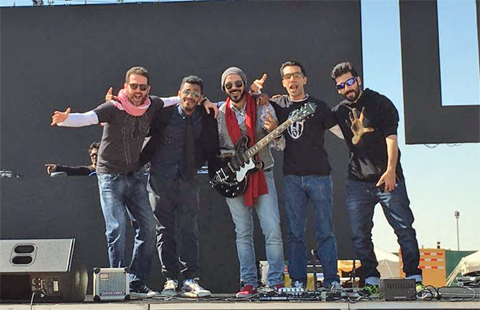 The Afterthought
The AfterthoughtThe Afterthought was once known as Kuwait's best-kept secret. Now, however, this electric band - composed of five members: Bassam "Buzz" Shuhaibar, Zakariya "Zak" Musawi, Husain Al-harbi, Aziz Baqer and Omar Salem - is a priority for Kuwait's choice of musicians, whether for Nuqat at 360 Mall or Shakshooka Market. At their latest event for Qout Market at Shaheed Park, they drove the crowd so wild, that when they ended their segment, the audience kept chanting: "One more song! One more song!"
What makes The Afterthought magical is that the band members are not just there to perform. Yes, performance matters - which is evident in their professionalism and ability to captivate an audience with the energetic field they create on stage. But more importantly, they adore music. Their passion is so expansive, they manage to transcend labels while inviting the audience to develop an ear for music not confined to one genre. In doing so, they elevate our frequency.
I am honored that I got to interview "Buzz", who is representing the band for this feature, and certain that his answers will blow you away, as they did me! You have been warned...
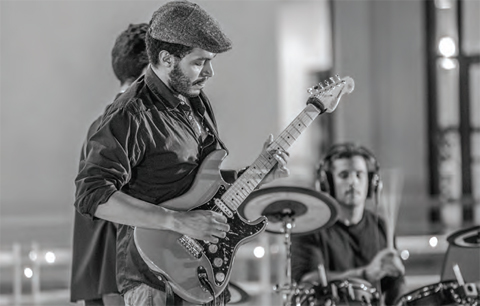 Omar Salem, rhythm/lead guitar is pictured at ACK. — Photo by Abdulaziz Safar Ali
Omar Salem, rhythm/lead guitar is pictured at ACK. — Photo by Abdulaziz Safar AliKuwait Times: Musicians translate an intangible force within themselves into lyrics or melody, sometimes simultaneously. This is - in turn - projected into the outer world, but then it goes right back inside and touches our innermost core. Is this why it resonates so profoundly for many souls globally?
Buzz: I have always maintained that music is the only truly international language. Many argue that that accolade belongs to mathematics, but numbers and symbols differ from country to country and culture to culture. Conversely, when you draw a musical note on a stave and place it in front of a musician, that note is going to be interpreted - and subsequently played - exactly the same way in Mongolia as it would be in the Ivory Coast. As such, music becomes the ultimate medium of communication, one that is more far-reaching than any other.
The subjectivity of music is another reason it resonates universally. Each genre has its unique soul which will attract interest from a certain population. This is especially true today, where individuality is prized above all else: as our own experiential diversity defines who we are, so does the music we listen to. And we will inevitably interpret it our own way.
That ''intangible force'' you refer to can be incredibly strong. Some, like myself, focus on the lyrics and the message they deliver. This is what drives my writing process: whenever the band begins work on a new song, the melody is developed in a basic enough way where I have a workable structure to add words to. I rarely sit down with a theme in mind; rather, I tend to wait and see what lyrics will form based on the balance (or ''scansion'') of the melody and fine-tune them until I am happy with the flow. That first line is always the hardest, but once it's done the rest of the song tends to write itself. That being said, I always try to make sure that my lyrics read like standalone poetry, so their effect would not be diminished without any accompanying music. Eddie Vedder and Bono are two masters at accomplishing this.
Whilst lyrics are extremely important, so too is musical arrangement. Some may focus on the individual instrument of their choice, whilst others will be moved by the holistic experience of the rhythm itself. This reinforces my earlier comment related to the universality of music; one doesn't have to be from Latin America in order to appreciate a great salsa/merengue track, because once that beat kicks in, you are going to feel it.
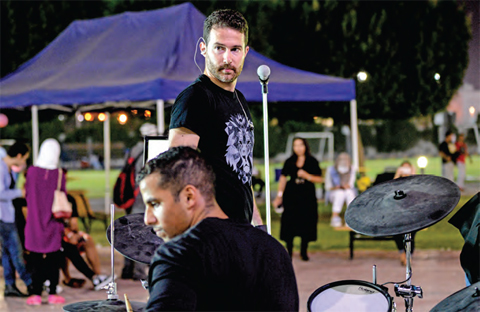 Bassam “Buzz” Shuhaibar, co-founder front man, lead vocals, lyricist and composer is pictured at ACK. — Photo by Abdulaziz Safar Ali
Bassam “Buzz” Shuhaibar, co-founder front man, lead vocals, lyricist and composer is pictured at ACK. — Photo by Abdulaziz Safar AliKT: In movies, the soundtrack can reflect the mood of the characters or the genre. We know we are watching a horror or thriller when eerie music is playing; additionally, a song can tell us the exact moment a couple fell in love, without even a word having been uttered. Is your choice of the songs you play reflective of your mood in a given moment, or do you practice and then present the songs to the audience, accordingly?
Buzz: I can vouch for the sincerity of the music we write. I would go as far as to say it is representative of a particular phase or state of mind that was experienced at a given period during our lives. If you were to trace the origins of almost every song we have ever written since 1997, it would more-or-less read like a discographic diary. I say ''almost'' because once-in-a-while I like to push the creative boundaries and challenge myself with "empathy writing" - where I put myself in a situation that is on the opposite side of the emotional spectrum that I happen to be experiencing at the time. I also like to project whatever mood I'm in onto a metaphorical or allegorical canvas, which ends up being as cathartic as it is creative.
Insofar as the song choices we make, we tend to just go with the flow. We focus a lot on covering bands we love, whilst gradually introducing more originals into our setlists. Our inspiration is drawn from rock, grunge, 80's and even folk. We have a standard song "bank" that we draw from for every gig, but the choices are made based more on mood rather than design. We also try to learn new material in between, especially when there is an occasion associated with the show, e.g. the winter holiday season or the passing of a musical legend, such as the recent tragic death of George Michael. We will learn a song or two and perform them in tribute. For example, we performed ''Plush'' by Stone Temple Pilots towards the end of 2015 in order to recognize the demise of their lead singer, Scott Weiland. We plan on doing the same vis-à-vis Michael.
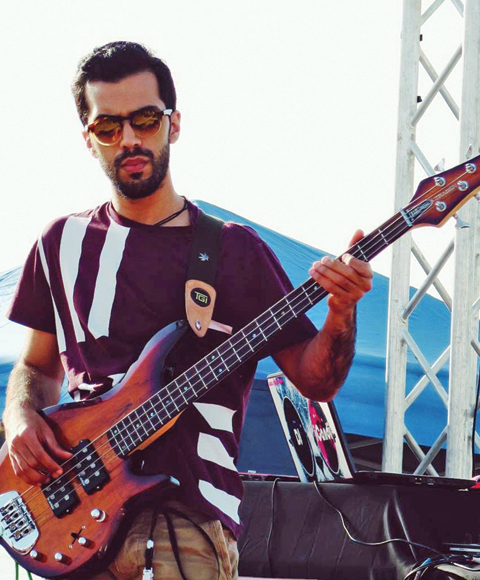 Husain Al-Harbi, bass guitar and logistics manager is pictured at Taste of Q8 Food Festival. — Photo by Ghaneema Qudmani
Husain Al-Harbi, bass guitar and logistics manager is pictured at Taste of Q8 Food Festival. — Photo by Ghaneema QudmaniKT: Some musicians draw attention to particular causes with the aim of heightening social awareness, while others use their forum of expression to help others escape from the mayhem of our planet. Do you think music should be used as social activism or simply a way to leave behind our sorrows and let its majesty propel us to another paradigm?
Buzz: That's the beauty of music. It is multi-faceted, pliable, malleable... So my answer to your question is "all of the above". Bob Dylan became the unofficial spokesperson for a generation during the Vietnam War in the 60's and 70's; Rap/Hip-Hop became the cultural representation of a marginalized minority in the 80's; Geldof and Band Aid raised awareness of the dire famine situation in Africa in an unprecedented way... the list goes on. Music is an incredibly powerful platform from which to sound off on the global challenges being faced.
Music can also transcend space and time. How many instances has a track come on that immediately reminded you of a milestone or special event in your life? They say smell is the sense most strongly associated with memory; I say sound comes in a very close second.
To drive the point home: I remember the first time I heard the song ''Black'' by Pearl Jam. I was 17, and a friend of mine lent me a copy of their debut album, ''Ten''. This was amusing because back then I was really into hip-hop and R 'n' B, so the concept of grunge or rock was as offensive as it was abstract. I decided to give it a go, so I let it be my wake-up alarm for the morning. I was awakened by the unmistakable tones of ''Why Go'' and began my morning routine. I was brushing my teeth by the time "Black" came on, and I remember stopping midway and sticking my head out the bathroom door to get a better listen. There was this incredible electrical energy buzzing through me, and I was hooked. To this day, if I ever hear or perform it, I become that 17-year-old kid all over again.
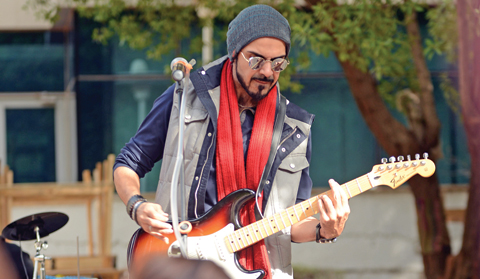 Zakariya “Zak” Musawi, co-founder rhythm/lead guitar, keyboards, backing vocals and composer is pictured at Shakshooka Market, Secret Garden. — Photo by Abdulaziz Safar Ali
Zakariya “Zak” Musawi, co-founder rhythm/lead guitar, keyboards, backing vocals and composer is pictured at Shakshooka Market, Secret Garden. — Photo by Abdulaziz Safar AliKT: Though the music scene in Kuwait has been catapulted to higher realms, some people think that music has corruptive tendencies. What would you say to those who are afraid of it?
Buzz: I cannot blame them, because it is human nature to fear the unknown or what is not understood. Those who may not appreciate music have their reasons, which I fully respect. What I can say is, I promise we don't bite! Levity aside, I am always pleasantly surprised at the diversity of our audiences throughout the years. Their energy and unwavering support are what make it all worthwhile. After all: no fans... no band.
I am equally impressed with how what was once a nascent and reluctant music scene has now thrived into a full-on burgeoning community. When Zak and I started out, in the late 90's, a Kuwaiti rock band was an extremely rare species. Now there are plenty of local groups covering every aspect of the musical spectrum, which makes me as happy as it does proud.
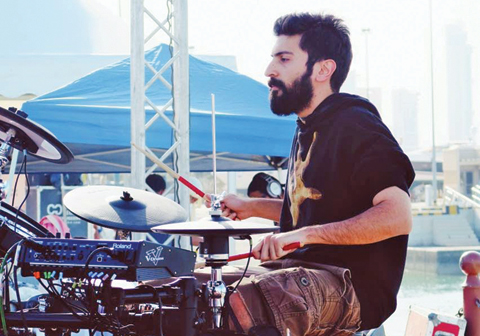 Aziz Baqer, drums/percussion is pictured at Taste of Q8 Food Festival. — Photo by Ghaneema Qudmani
Aziz Baqer, drums/percussion is pictured at Taste of Q8 Food Festival. — Photo by Ghaneema QudmaniKT: Finally, Bocelli refers to singing as an instrument. So, singers and musicians waltz in the same space. Is the marriage of voice and sound what makes a song strike such a potent chord?
Buzz: Absolutely. Even the lyrics themselves are unnecessary if the overall mood is effectively translated by instruments. However, being a vocalist and lyricist myself, I would be lying if I said I didn't feel that words are extremely important as well. They are the guiding, thematic force of a song and will influence what direction the voice takes. Intonation, power, intimacy... each should be governed by the message the song is trying to convey. Nothing is more gratifying than positive feedback after a performance, where a listener claims they reacted in some physical way (e.g. tears) or felt inspired in one form or another. If my lyrics can strike the intended nerve, my mission has been accomplished.
For more information, follow them on social media:
Facebook: www.facebook.com/theafterthoughtrox
Instagram: @afterthoughtrox
Snapchat: @afterthoughtrox
Website: www.theafterthought.rocks
Interviewed by Nejoud Al-Yagout
1











